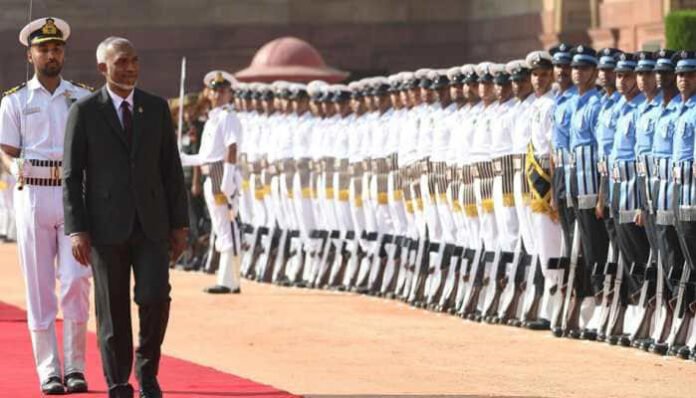Newly elected Maldivian President Mohammad Muizzu has assured India of his government’s commitment to maintaining and strengthening the historically close ties between the two nations, dispelling concerns that his administration might shift the Maldives’ foreign policy stance. Muizzu, who was elected in September 2024, is seen by some as having a more pro-China orientation than his predecessor, President Ibrahim Mohamed Solih, sparking speculations about a potential rebalancing of the Maldives’ foreign relations. In a recent public address, however, Muizzu sought to quell these fears, asserting that his government would never harm relations with India.
A Reassuring Message to India
During a televised speech shortly after taking office, President Muizzu emphasized that India’s role as a key development partner and neighbor to the Maldives remains vital. “We understand the importance of our relationship with India,” Muizzu stated. “I want to assure the people of India that our ties will remain strong, and we will never take any steps that will harm this relationship. The Maldives and India have shared a bond based on mutual respect, cooperation, and regional security, and we will continue to build on that foundation.”
His remarks come in response to speculation that his administration might tilt towards China, a perception rooted in Muizzu’s political background. Muizzu is a member of the Progressive Party of Maldives (PPM), which had fostered closer ties with Beijing during its previous stint in power under former President Abdulla Yameen. The PPM government had embraced China’s Belt and Road Initiative (BRI), accepting significant Chinese investments in infrastructure projects. In contrast, the outgoing Solih administration pivoted towards India, adopting the “India First” policy and boosting cooperation with New Delhi in areas such as security, trade, and development.
The ‘India Out’ Campaign and Muizzu’s Stance
One of the most contentious issues during the presidential campaign was the “India Out” movement, which was championed by opposition forces, including Muizzu’s supporters, as a protest against the perceived overreach of Indian influence in Maldivian affairs. The movement particularly opposed the presence of Indian military personnel stationed in the Maldives as part of various defense cooperation agreements.
President Muizzu, who had earlier been linked to this movement, addressed these concerns directly, stating that while his government prioritizes Maldives’ sovereignty and independence, it is also committed to cooperation with India. “I understand the sensitivities of the people regarding foreign presence, but I want to clarify that our policies will be rooted in mutual respect. We will work with India to ensure that any misunderstandings are addressed, and our cooperation in defense and security remains transparent,” Muizzu added.
This diplomatic outreach appears to be a clear effort to distance his administration from the more hardline rhetoric of the “India Out” campaign and to maintain the essential defense and security partnerships that have long been a pillar of Maldives-India relations.
Strategic Importance of India-Maldives Relations
India and the Maldives have shared a long-standing partnership, particularly in terms of security cooperation in the Indian Ocean region. As a key player in maintaining regional maritime security, India views the Maldives as a strategic partner, especially in efforts to counter terrorism, piracy, and drug trafficking in the region. Over the years, the two countries have signed numerous defense agreements, including the installation of coastal radars, joint patrols, and regular military exercises.
Under Solih’s administration, the Maldives became more closely aligned with India’s strategic interests. The country also saw significant Indian investments in infrastructure, tourism, healthcare, and education. During the COVID-19 pandemic, India was quick to provide medical aid and vaccines, further cementing its position as the Maldives’ primary development partner.
However, the geopolitical dynamics of the region are complex, with China also seeking to expand its influence. Beijing’s investments in Maldives’ infrastructure projects, including the construction of bridges, airports, and housing units, have created a significant Chinese presence in the island nation, leading to concerns in India about a potential Chinese encirclement strategy.
Balancing Relations with China
Muizzu’s administration is expected to continue working with China on various infrastructure projects that were initiated during the PPM’s previous term in office. While Muizzu has signaled his willingness to engage with China, he has been careful to position this within a broader framework of non-alignment, reiterating that his foreign policy will not be dominated by any single power.
“The Maldives will continue to engage with all nations, including China, in ways that benefit our people and our development goals. We will not align ourselves with one nation against another but will work towards a foreign policy that enhances our national interests,” Muizzu said in his address.
President Mohammad Muizzu’s reassurances to India suggest that, despite earlier concerns, his administration will take a pragmatic approach in its foreign relations. His pledge to maintain the Maldives’ strong ties with India, while balancing engagements with other global powers like China, indicates that the Maldives will seek to navigate the complex geopolitical landscape of the Indian Ocean with caution and diplomacy.
India will likely welcome these reassurances but will continue to closely monitor developments in the Maldives to ensure that its strategic interests in the region remain protected. For the Maldives, the challenge ahead will be in maintaining a balanced and sovereign foreign policy while ensuring the continuation of beneficial partnerships with both India and China.

